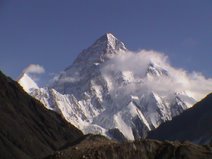

Syed Farooq Hasnat
- May 24th, 2007
Pervez Musharraf. Even the most well-versed pundits of Pakistani politics did not expect the turmoil currently plaguing the country.
General Pervez Musharraf, who has ruled Pakistan for nearly eight years without much resistance, has suddenly found himself in the middle of a crisis. The government mishandled an otherwise routine judicial matter right from the start. First, the chief justice of Pakistan’s Supreme Court, Iftikhar Muhammad Chaudhry, was suspended. Next, the order was hurriedly withdrawn since it contradicted the spirit of Pakistan’s constitution. Then, the chief justice and his family were virtually put under house arrest, which provoked sharp condemnations from across the country.
Chaudhry has become a symbol of resistance against Musharraf’s dictatorial rule. A mass movement supporting Justice Chaudhry is spearheaded by lawyers and supported by opposition political parties and civil rights groups.
When the army staged a coup in October 1999, the major political parties led by Benazir Bhutto and Nawaz Sharif had lost public support because of rampant corruption and misrule during their administrations. General Musharraf took advantage of public apathy and exiled both leaders - although for different reasons.
In recent months the high court under Chief Justice Chaudhry showed its strength when it dealt with habeas corpus issues and other matters that linked the government to corruption. In the past, the military governments easily intimidated Pakistan’s high courts. Notable among the court decisions that went against the regime was the issue of missing persons. At the time, it was feared that many Pakistani citizens were being handed over to the US intelligence agencies without providing valid evidence that they were involved in any unlawful acts. The second matter, which irked the military government, was the court’s nullification of the sale of the Pakistan Steel Mill, which was to be sold to a private party known to the Prime Minister, at a much cheaper price than its market value.
The Supreme Court’s new attitude is putting Musharraf on edge ahead of the 2007 elections, which are important for his survival as Pakistan’s leader. The court still has a number of contentious issues to decide that also make the military leadership nervous: Can the president be elected twice by the same assembly? Could the president remain in military uniform and still be president? Should the two exiled leaders Bhutto and Sharif be allowed to take part in the elections? There are also questions about the transparency of the elections and the dual nationality of the prime minister.
With the threat of an independent judiciary, Musharraf removed the chief justice, but he miscalculated the resilience of the judge who refused to resign. Musharraf also miscalculated the level of widespread public support for the opponent of his military rule. Street protests also exposed the vulnerability of his ruling Q League (the Pakistan Muslim League).
This is the first time in Pakistan’s 60-year history that a mass movement has been launched without the leadership of political parties. Now it’s the politicians who are following the dictates of the public mood and the legal community. This is also the first time that the army as an institution has been the target of public resentment. Previously, it was individual military personalities who were singled out for criticism.
Pakistan is not, however, politically “fragmented” along the lines of moderates and fundamentalists, as Musharraf has claimed. Recent events illustrate that the real contention is between those pushing for democratic reforms and those who support continued military rule.
Initially, the Musharraf regime thought public resentment would fizzle, mainly because of the summer heat and the political apathy that has prevailed for the last eight years. Instead, with every passing day the situation has worsened for Musharraf. Unprecedented public support for the judge and opposition to the government was apparent on May 5 when Justice Chaudhry was showered with rose petals by supporters as he journeyed from Islamabad to Lahore. The trip, which usually takes about five hours, took more than 26 hours as he greeted supporters along the way. Many had waited overnight to greet their new “symbol of resistance.”
On May 12, when the Chief Justice visited Karachi at the invitation of Sindh High Court Bar Association, an ethnic group, MQM — a staunch supporter of General Musharraf — blocked the judge from addressing the lawyers gathered there. Karachi erupted. After three days of riots, 42 people had died and more than 150 were injured. On May 16, General Musharraf gave his full backing to the MQM and showed no sympathy for the killings. The Karachi carnage has further weakened his military rule.
The general is left with few options for survival. He and his ministers have hinted at imposing a state of emergency or even Martial Law. He specifically stated that he is ready for extra constitutional measures to enhance his stay in power. But the mood of the people shows that such tactics will face widespread and stiff public resistance.
The only option left for General Musharraf is to form a neutral interim government and to hold free and open parliamentary elections. It’s time for him to quit - the army and the presidency.


No comments:
Post a Comment